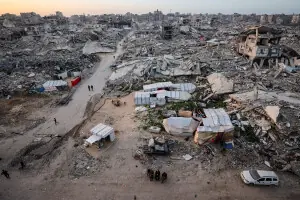Over 2,000 pilgrims suffer heat stress during Hajj
2 min readDuring the annual Hajj pilgrimage in Saudi Arabia, more than 2,000 people have suffered from heat stress as temperatures soared to a scorching 48°C (118°F), news agencies reported.
Saudi officials reported approximately 1,700 heat stress cases on Thursday, adding to the 287 previously recorded cases, AFP said.
The majority of these cases were reported as pilgrims continued to remain at the holy sites even after the main rituals had concluded. The Saudi health ministry urged people to stay out of the sun and stay hydrated, emphasizing the importance of drinking plenty of water.
Meanwhile, at least 230 people died during the Hajj, most of them due to heart and respiratory ailments. The majority of them were from Indonesia, the largest Muslim nation by population.
The consul general of Indonesia confirmed that at least 209 Indonesian pilgrims had passed away, citing heart and respiratory ailments as the primary causes of death.
However, he acknowledged that some individuals had fainted during the pilgrimage due to the intense heat.
Other countries also reported deaths, including Iran with 10 deaths, Algeria with eight deaths, Morocco with four deaths, and Egypt with eight deaths, according to official sources.
One Pakistani Hajj official also died of cardiac arrest at Arafat Plain on the first day of hajj.
Additionally, hundreds of people were treated for heart problems, with one Filipino man successfully undergoing open-heart surgery in Mecca.
The extreme temperatures posed a significant challenge during this year’s Hajj, prompting the Saudi authorities to deploy thousands of paramedics and establish field hospitals to address the risks.
The Gulf region’s harsh climate, coupled with the impact of global warming, has raised concerns about the habitability of certain areas. The United Nations’ intergovernmental panel on climate change has warned that parts of the region could become uninhabitable by the end of the century. Experts predict that maximum summer temperatures of 50°C (122°F) could become a regular occurrence in the coming decades.
Despite the heat-related challenges, the Hajj pilgrimage remains a significant event for Muslims worldwide, with efforts continually made to ensure the safety and well-being of participants.
For the latest news, follow us on Twitter @Aaj_Urdu. We are also on Facebook, Instagram and YouTube.

























Comments are closed on this story.